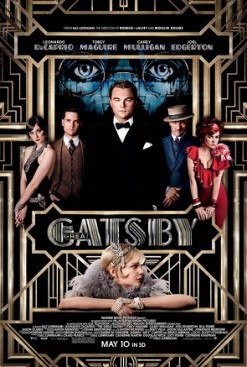
 I think the only fair way to review a movie like The Great Gatsby (IMDB) is to ask how well it stands on its own. How good would this movie be if you had never read the novel, or if the novel had never existed and this were an original work?
I think the only fair way to review a movie like The Great Gatsby (IMDB) is to ask how well it stands on its own. How good would this movie be if you had never read the novel, or if the novel had never existed and this were an original work?
By that standard it seems a mixed bag. It’s a high quality production. It looks really terrific. The soundtrack seems a bit off for a story set in the 1920s but there’s nothing technically wrong with it. The acting is appropriate for a rather melodramatic story, including a fine scenery-chewing star turn by Leonardo DiCaprio. The story however is the main problem. As told here it leaves me cold.
The movie begins with a framing device that was not in the original novel but which is presumably intended to allow the movie to be “novelistic”. Nick Carraway (Tobey Maguire) has been committed to a sanitarium for depression and “morbid alcoholism.” His psychiatrist tells him to write down the events that are haunting him. Carraway sits down at a typewriter and begins to pound out a manuscript that will eventually form a novel called The Great Gatsby.
Nick tells how as an ambitious young bond broker he rented a small inexpensive house on Long Island, convenient to his job on Wall Street. It was actually a cottage on a palatial estate belonging to Jay Gatsby (DiCaprio), a mysterious but very charismatic young multimillionaire who hosted spectacular parties every weekend.
Gatsby takes an interest in Nick and it turns out that he has an ulterior motive. Gatsby is obsessed with Nick’s cousin Daisy Buchanan (Carey Mulligan) with whom he had a brief romantic encounter 5 years before.
Daisy lives on an estate just across the bay from Gatsby’s with her husband Tom (Joel Edgerton). Tom is a wealthy aristocrat with a crude, vulgar soul. Daisy seems a total airhead but perhaps that’s just an act she puts on.
The story suffers from a lack of likeable characters. We have a narrator who is such a nonentity that the other characters think nothing of telling him their darkest secrets. We have some other characters with lots of money but no class. Finally we have the central character who seems admirable in some ways but is deluded and self-destructive.
The story is actually rather like one of those old medieval romances in which a knight was inspired to do great deeds by his love for a fair lady. These stories generally didn’t have a romantic happy ending because the knight didn’t actually know the lady very well and anyway she was already married to someone else. But that was OK because the knight’s great deeds and sad end were a justification in themselves. Still, modern audiences tend to find such tales unsatisfying.

